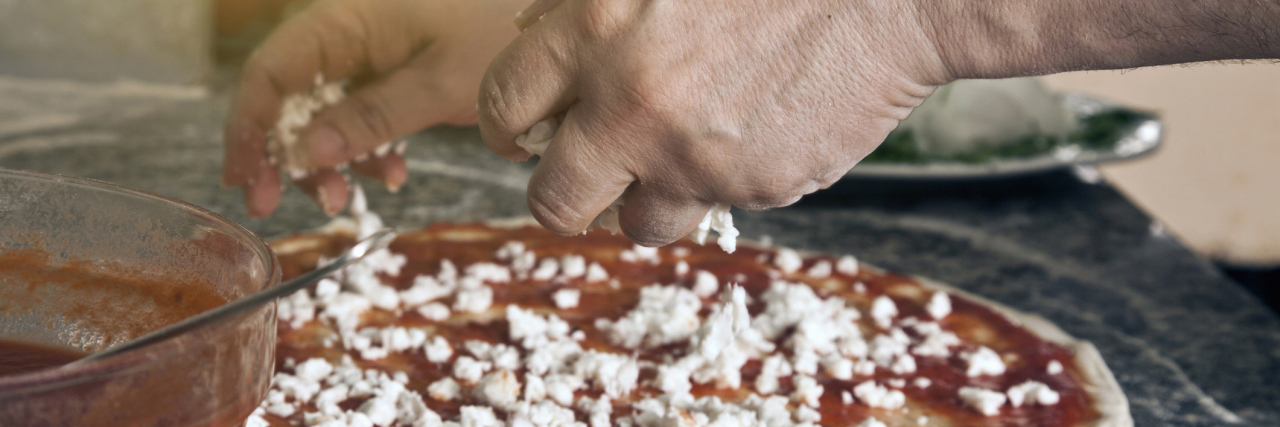I was diagnosed with major depression close to two years ago, giving a name and professional blessing to an illness that has afflicted me for most of my life. The last few years have been an especially confusing time. Suicide attempts, self-harm, therapy, antidepressants, a jumble of people and things and events that just didn’t seem to make sense to me. Then I started working at a local family-owned pizzeria, and suddenly it all clicked: Depression is pizza.
Everything I did during a standard work day, I could equate to my dealings with depression. First, there’s the dough mixer. It churns and spins and agitates the dough mixture, the flour and salt and yeast and water, and it just goes and goes all day long. This is my brain, the core of the depression, the thoughts and feelings and ideas that both drive and comprise it, constantly swirling around in my head. Then the dough comes out of the mixer, and it gets weighed and cut into individual pieces to become the base for future delicious dinners. We take those pieces, knead and fold them into themselves to make compressed little balls, then flatten them into trays and store them in the freezer. That’s what I do every time I wake up and get ready for work; I take those thoughts and feelings and bundle them up nice and tight, and store them away for later so I can present a pleasant face to the world outside my room.
Eventually, after they’ve risen and settled and are prepared to be used, the dough balls get taken out of the freezer and taken up to the front of the restaurant, where they’re rolled out, spun flat, get their toppings and are placed in the oven to cook. Those thoughts I’ve been keeping in the back of my head are now starting to gain a life of their own, so they rise to the front, shouting to be heard. They get topped with cynicism, sarcasm and morbidity, and then cook until they’re ready to burn the next person who touches them without the proper protection.
Then the pizza is taken out of the oven, and one of three things can happen. First, it gets taken out to be consumed by the hungry customers seated in the restaurant. These are the struggles I can deal with by myself. The pizza gets consumed, then there’s sometimes a little bit of a mess to clean up, but it’s gone and done with.
Second, it gets carried out by customers who want to enjoy their fine Italian cuisine in the comfort of their own homes. This is the antidepressants at work; I have these problematic pizzas that need to be gotten rid of and they come get rid of them, and I don’t have to think about them again after they get taken out the door.
Third, the pizza gets sent out for delivery. I take the orders and drive them out, offer them up to the hungry people of my town for consumption. This is my social support, my friends and family, my therapist and doctor, everybody who I can go to for advice, help or just to vent. I take my problems, my struggles to them, and after some conversation, maybe a good cry (though my actual customers might find that awkward) and some words of encouragement or two, I’m ready to get back to work until my next delivery comes up.
The best part of the day, though, is my hour-long break for lunch. No deliveries, no pizza, no dough, no stress. A chance to breathe, to relax. This is the time I spend with my closest friends, the people who I truly love and who make my life worth living a little while longer. The few people who make all the pain, the numbness, the fear and sadness and everything fade away, for a short time at least. That give me the energy to keep going and help me see the day isn’t too bad after all.
Depression is hundreds and hundreds of pizzas, every single week. Trying to eat it all by yourself is unhealthy and dangerous, and it may kill you. Send it out into the world any way you can. Find somebody to share it with. Give it away to anybody who’s willing to take a bite. You’ll feel better, and the people around you, who care about you, will be happy you shared and allowed them to help.
If you or someone you know needs help, visit our suicide prevention resources page.
If you need support right now, call the National Suicide Prevention Lifeline at 1-800-273-8255, the Trevor Project at 1-866-488-7386 or reach the Crisis Text Line by texting “START” to 741-741.
We want to hear your story. Become a Mighty contributor here.
Getty Images photo via WALTER ZERLA

